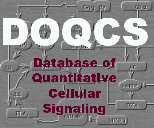 |  |  PP1_PSD PP1_PSD |
Enter a Search String | | Special character and space not allowed in the query term.
Search string should be at least 2 characters long. |
Reaction List for pathway CaM (Pathway Number 273) | | Kd is calculated only for second order reactions, like nA+nB <->nC or nA<->nC+nD, where n is number and A,B,C,D are molecules, where as for first order reactions Keq is calculated. Kd for higher order reactions is not considered. |
| | Name | Kf | Kb | Kd | tau | Substrate | Product | | 1 |
CaM-Ca3-bind-Ca-
PSD | 0.465
(uM^-1 s^-1) | 10
(s^-1) | Kd(bf) = 21.5048(uM) | - | CaM-Ca3-PSD
Ca-PSD
| CaM-Ca4-PSD
| | | Use K3 = 21.5 uM here from Stemmer and Klee table 3. kb/kf =21.5 * 6e5 so kf = 7.75e-7, kb = 10 | | 2 |
CaM-TR2-bind-Ca | 71.999
(uM^-2 s^-1) | 72
(s^-1) | Kd(af) = 1(uM) | - | CaM
Ca
Ca
| CaM-TR2-Ca2
| | | Lets use the fast rate consts here. Since the rates are so different, I am not sure whether the order is relevant. These correspond to the TR2C fragment. We use the Martin et al rates here, plus the Drabicowski binding consts. All are scaled by 3X to cell temp. kf = 2e-10 kb = 72 Stemmer & Klee: K1=.9, K2=1.1. Assume 1.0uM for both. kb/kf=3.6e11. If kb=72, kf = 2e-10 (Exactly the same !).... | | 3 |
CaM-TR2-bind-Ca-
PSD | 72
(uM^-2 s^-1) | 72
(s^-1) | Kd(af) = 1(uM) | - | CaM-PSD
Ca-PSD
Ca-PSD
| CaM-TR2-Ca2-PSD
| | | Lets use the fast rate consts here. Since the rates are so different, I am not sure whether the order is relevant. These correspond to the TR2C fragment. We use the Martin et al rates here, plus the Drabicowski binding consts. All are scaled by 3X to cell temp. kf = 2e-10 kb = 72 Stemmer & Klee: K1=.9, K2=1.1. Assume 1.0uM for both. kb/kf=3.6e11. If kb=72, kf = 2e-10 (Exactly the same !).... | | 4 |
CaM-TR2-Ca2-bind
-Ca | 3.6
(uM^-1 s^-1) | 10
(s^-1) | Kd(bf) = 2.7778(uM) | - | CaM-TR2-Ca2
Ca
| CaM-Ca3
| | | K3 = 21.5, K4 = 2.8. Assuming that the K4 step happens first, we get kb/kf = 2.8 uM = 1.68e6 so kf =6e-6 assuming kb = 10 | | 5 |
CaM-TR2-Ca2-bind
-Ca-PSD | 3.6
(uM^-1 s^-1) | 10
(s^-1) | Kd(bf) = 2.7778(uM) | - | CaM-TR2-Ca2-PSD
Ca-PSD
| CaM-Ca3-PSD
| | | K3 = 21.5, K4 = 2.8. Assuming that the K4 step happens first, we get kb/kf = 2.8 uM = 1.68e6 so kf =6e-6 assuming kb = 10 | | 6 |
dephosph-neurogr
anin | 0.005
(s^-1) | 0
(s^-1) | - | - | neurogranin*
| neurogranin
| | | This is put in to keep the basal levels of neurogranin* experimentally reasonable. From various papers, specially Ramakers et al JBC 270:23 1995 13892-13898, it looks like the basal level of phosph is between 20 and 40%. I est around 25 % The kf of 0.005 gives around this level at basal PKC activity levels of 0.1 uM active PKC. | | 7 |
dephosph-neurogr
anin_
PSD | 0.005
(s^-1) | 0
(s^-1) | - | - | neurogranin*_
PSD
| neurogranin_PSD
| | | This is put in to keep the basal levels of neurogranin* experimentally reasonable. From various papers, specially Ramakers et al JBC 270:23 1995 13892-13898, it looks like the basal level of phosph is between 20 and 40%. I est around 25 % The kf of 0.005 gives around this level at basal PKC activity levels of 0.1 uM active PKC. | | 8 |
neurogranin-bind
-CaM | 0.3
(uM^-1 s^-1) | 1
(s^-1) | Kd(bf) = 3.3333(uM) | - | neurogranin
CaM
| neurogranin-CaM
| | | Surprisingly, no direct info on rates from neurogranin at this time. These rates are based on GAP-43 binding studies. As GAP-43 and neurogranin share near identity in the CaM/PKC binding regions, and also similarity in phosph and dephosph rates, I am borrowing GAP-43 kinetic info. See Alexander et al JBC 262:13 6108-6113 1987 | | 9 |
neurogranin-bind
-CaM_
PSD | 0.3
(uM^-1 s^-1) | 1
(s^-1) | Kd(bf) = 3.3333(uM) | - | neurogranin_PSD
CaM-PSD
|
neurogranin-CaM_
PSD
| | | Surprisingly, no direct info on rates from neurogranin at this time. These rates are based on GAP-43 binding studies. As GAP-43 and neurogranin share near identity in the CaM/PKC binding regions, and also similarity in phosph and dephosph rates, I am borrowing GAP-43 kinetic info. See Alexander et al JBC 262:13 6108-6113 1987 |
Pathway Details Molecule List Enzyme List Reaction List
| Database compilation and code copyright (C) 2022, Upinder S. Bhalla and NCBS/TIFR
This Copyright is applied to ensure that the contents of this database remain freely available. Please see FAQ for details. |
|
